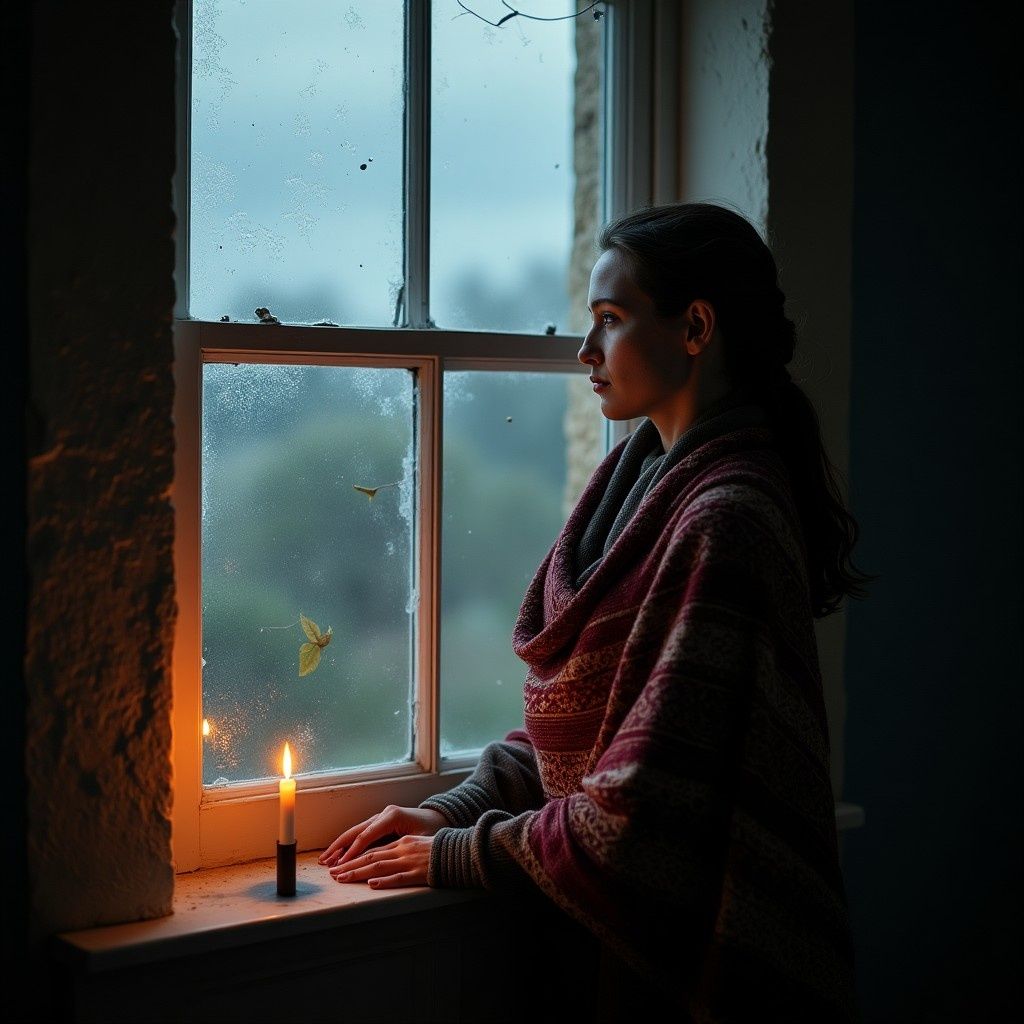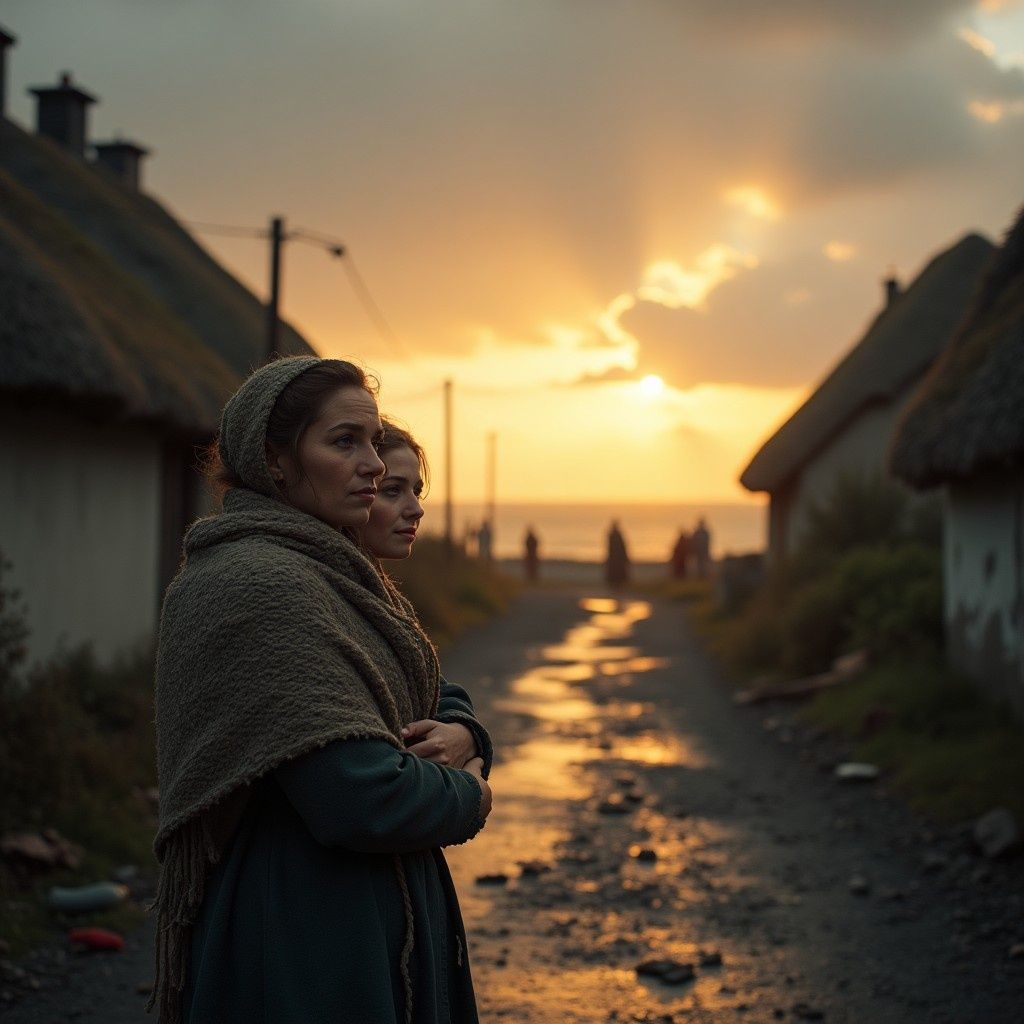**Title: Whispers of the Big Wind**
The sky was a deep, foreboding gray, a color that seemed to swallow the very light of the world. It was January 6, 1839, and the air was heavy with an unsettling stillness, a quiet before the storm. In the small village of Skerries, north of Dublin, the sea whispered secrets to the shore, secrets of a tempest yet to come.

Mairead O'Sullivan stood at the window of her modest cottage, her fingers absentmindedly tracing the frost that crept along the glass. Her husband, Seamus, was out at sea, one of the many fishermen who braved the waters to bring home their daily bread. The wind had been restless all day, a harbinger of the chaos that would soon unfold. As dusk descended, the wind began to howl, a banshee's wail that rattled the bones of the village. Mairead clutched her shawl tighter around her shoulders, her heart a drumbeat of worry. She thought of Seamus, his face weathered by the sun and sea, his eyes always filled with laughter and love. Would he make it back before the storm hit? The wind grew fiercer, a beast unleashed upon the land. It tore at the thatched roofs, sent shutters clattering, and roared through the narrow streets. Mairead lit a candle, its flickering flame a fragile beacon in the encroaching darkness. She prayed silently, her lips moving in rhythm with the tempest outside.

In the harbor, Seamus fought against the raging sea, his hands raw from the ropes, his body battered by the relentless waves. The storm was unlike anything he had ever encountered, a force of nature that defied understanding. He thought of Mairead, her smile a lighthouse in his mind, guiding him home. Back in the village, the wind's fury reached its peak. It was a cacophony of destruction, a symphony of chaos that left nothing untouched. Trees were uprooted, their ancient limbs crashing to the ground. Houses shuddered under the onslaught, their walls groaning in protest. Mairead's cottage was no exception; the roof began to peel away, the walls trembling as if in fear. Mairead gathered her children, their eyes wide with terror, and huddled them close. She whispered words of comfort, her voice steady despite the storm's wrath. "We'll be alright," she promised, though her heart was heavy with doubt. As the night wore on, the storm showed no mercy. It raged and roared, a wild beast that refused to be tamed. Mairead's thoughts drifted to Seamus, and she wondered if he had found shelter, if he was safe. The uncertainty gnawed at her, a relentless ache that matched the storm's ferocity. Then, as suddenly as it had begun, the wind began to abate. The storm's fury lessened, its roar dwindling to a whisper. The village lay in ruins, a testament to the storm's power. But amidst the wreckage, there was hope. Mairead stepped outside, her eyes scanning the horizon for any sign of Seamus.

And there he was, a silhouette against the dawn, his figure battered but unbroken. He stumbled towards her, his steps unsteady but determined. Mairead ran to him, her heart soaring with relief. They embraced, their bodies entwined, a silent testament to their survival. The Night of the Big Wind had left its mark, a scar upon the land and its people. But it had also forged bonds, strengthened resolve, and reminded them of the fragility and resilience of life. As Mairead and Seamus stood together, the first light of day breaking over the horizon, they knew they would face whatever came next, side by side. In the years that followed, the storm became legend, a story passed down through generations. It was a reminder of nature's might, of the strength found in unity, and of the love that could weather any storm. And in the village of Skerries, Mairead and Seamus lived on, their lives a testament to the whispers of the Big Wind.

Mairead O'Sullivan stood at the window of her modest cottage, her fingers absentmindedly tracing the frost that crept along the glass. Her husband, Seamus, was out at sea, one of the many fishermen who braved the waters to bring home their daily bread. The wind had been restless all day, a harbinger of the chaos that would soon unfold. As dusk descended, the wind began to howl, a banshee's wail that rattled the bones of the village. Mairead clutched her shawl tighter around her shoulders, her heart a drumbeat of worry. She thought of Seamus, his face weathered by the sun and sea, his eyes always filled with laughter and love. Would he make it back before the storm hit? The wind grew fiercer, a beast unleashed upon the land. It tore at the thatched roofs, sent shutters clattering, and roared through the narrow streets. Mairead lit a candle, its flickering flame a fragile beacon in the encroaching darkness. She prayed silently, her lips moving in rhythm with the tempest outside.

In the harbor, Seamus fought against the raging sea, his hands raw from the ropes, his body battered by the relentless waves. The storm was unlike anything he had ever encountered, a force of nature that defied understanding. He thought of Mairead, her smile a lighthouse in his mind, guiding him home. Back in the village, the wind's fury reached its peak. It was a cacophony of destruction, a symphony of chaos that left nothing untouched. Trees were uprooted, their ancient limbs crashing to the ground. Houses shuddered under the onslaught, their walls groaning in protest. Mairead's cottage was no exception; the roof began to peel away, the walls trembling as if in fear. Mairead gathered her children, their eyes wide with terror, and huddled them close. She whispered words of comfort, her voice steady despite the storm's wrath. "We'll be alright," she promised, though her heart was heavy with doubt. As the night wore on, the storm showed no mercy. It raged and roared, a wild beast that refused to be tamed. Mairead's thoughts drifted to Seamus, and she wondered if he had found shelter, if he was safe. The uncertainty gnawed at her, a relentless ache that matched the storm's ferocity. Then, as suddenly as it had begun, the wind began to abate. The storm's fury lessened, its roar dwindling to a whisper. The village lay in ruins, a testament to the storm's power. But amidst the wreckage, there was hope. Mairead stepped outside, her eyes scanning the horizon for any sign of Seamus.

And there he was, a silhouette against the dawn, his figure battered but unbroken. He stumbled towards her, his steps unsteady but determined. Mairead ran to him, her heart soaring with relief. They embraced, their bodies entwined, a silent testament to their survival. The Night of the Big Wind had left its mark, a scar upon the land and its people. But it had also forged bonds, strengthened resolve, and reminded them of the fragility and resilience of life. As Mairead and Seamus stood together, the first light of day breaking over the horizon, they knew they would face whatever came next, side by side. In the years that followed, the storm became legend, a story passed down through generations. It was a reminder of nature's might, of the strength found in unity, and of the love that could weather any storm. And in the village of Skerries, Mairead and Seamus lived on, their lives a testament to the whispers of the Big Wind.
The Night of the Big Wind, or Oíche na Gaoithe Móire, was a devastating European windstorm that struck the United Kingdom of Great Britain and Ireland on January 6, 1839. It caused widespread destruction, with 20-25% of houses in north Dublin damaged or destroyed, and 42 ships wrecked, resulting in several hundred deaths. The storm, characterized by hurricane-force winds and a low barometric pressure of 918 hPa, was the worst to hit Ireland in 300 years. Its impact was so profound that it became embedded in Irish folklore, and later served as a reference point for age verification in the Old Age Pensions Act of 1908. The event is commemorated in Irish literature and remains a significant part of cultural memory.


Comments
Post a Comment